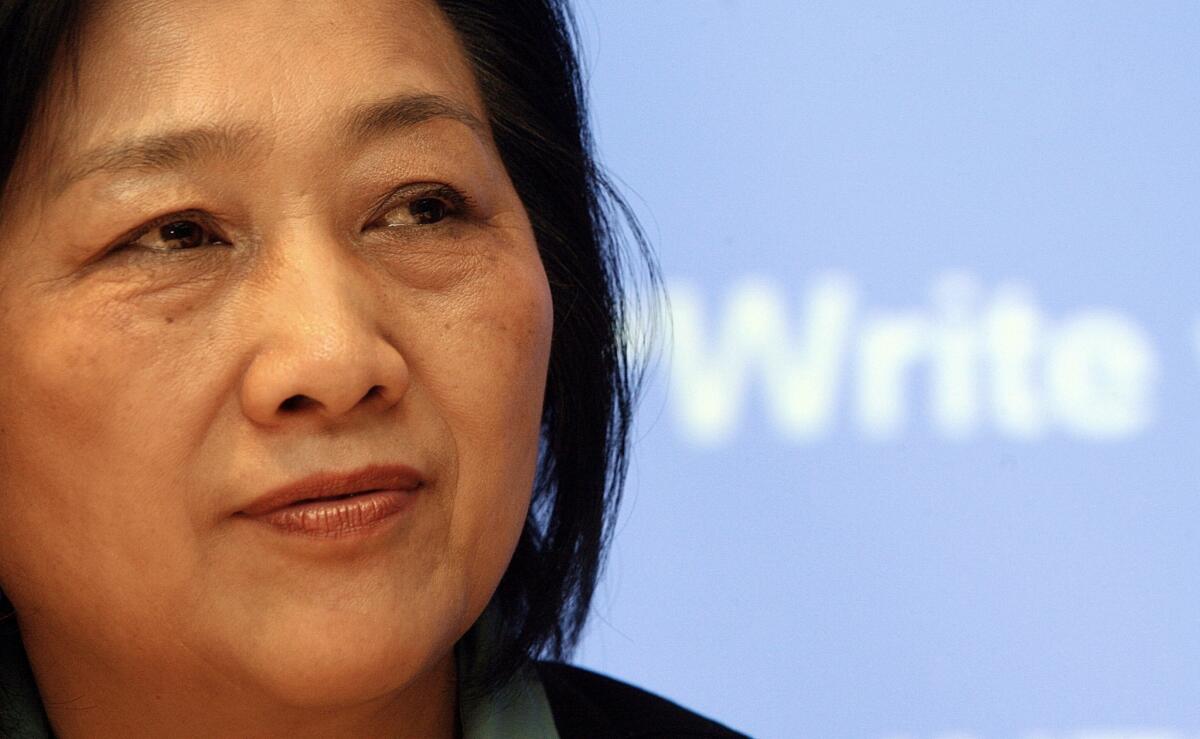With new rules, China tightens screws on press freedom

- Share via
Reporting from Beijing — For the past few months, freelance investigative journalist Ji Xuguang has been researching a story on the Chinese government’s program of demolishing people’s homes to make way for development projects. He planned to pitch it to one of his regular outlets, such as China Youth Daily, and have it published.
But his hopes sank this week when he saw the latest directive from China’s press regulator. Journalists are banned from writing “critical reports” without advance approval from their employers, the State Administration of Press, Publication, Radio, Film and Television warned on Wednesday. They also must not conduct interviews “outside their assigned area of coverage.”
“My heart went cold when I saw the notice -- I know it will be nearly impossible now for my story to see the light of day,” said Ji, 34, whose exposés have included the tale of a former civil servant who kept six women as sex slaves and killed two of them.
The new circular, he predicted, would have a chilling effect, discouraging editors from touchy subjects. “This rule is a real threat to us independent reporters. We are angry.”
So far, 2014 is shaping up as a year of tighter restrictions and pressure on the media in China.
In January, the country’s 250,000 reporters were required to pass a Marxist ideology exam. This spring, authorities began a crackdown on what they said was an epidemic of journalists making false news reports, taking bribes and extorting people.
In April, 70-year-old veteran journalist and activist Gao Yu disappeared in Beijing; two weeks later, a video of her confessing to the crime of leaking state secrets was aired on state-run TV. Authorities said she had provided a sensitive document to a foreign website but did not elaborate. Some observers said her case may be related to a Communist Party policy paper warning cadres to reject Western political values such as democracy and freedom of the press.
Censors lay a heavy hand on China’s media, and state-run outlets serve as a channel for party propaganda. But reforms in recent years have allowed the sector to become more commercialized and afforded some expansion of editorial freedom.
Nevertheless, China remains near the bottom of Reporters Without Borders’ Press Freedoms Index, and the country dropped two spots this year to No. 175, ahead of only Somalia, Syria, Turkmenistan, North Korea and Eritrea. (The United States is No. 46.)
“Despite having an astonishing[ly] vital and increasingly militant blogosphere, [China] continues to censor and jail dissident bloggers and journalists,” the group said. “This new power is also using its economic might to extend its influence over the media in Hong Kong, Macau and Taiwan, compromising their independence.”
In Hong Kong – a former British territory that reverted to Chinese rule in 1997 but enjoys greater freedom of the press than mainland China – a senior executive of the feisty Apple Daily said last week that two London-based banks, HSBC and Standard Chartered, had stopped buying ads in the paper because of pressure from Chinese authorities.
Spokespeople for the banks said the decision to end advertising was made solely on commercial grounds.
This week, Apple Daily, which has been giving extensive coverage to a Hong Kong pro-democracy campaign opposed by mainland authorities, saw its website crippled by hackers.
“There is no question that these attacks were malicious and aimed specifically at the most outspoken component of what remains of the region’s unfettered media,” the Hong Kong Journalists Assn. said. “It would appear that these were concerted efforts to silence a key component of the free press in this region.”
Hong Kong journalists are being intimidated physically as well. In February, men wielding meat cleavers ambushed and nearly killed a veteran journalist who had recently been ousted as editor of the Ming Pao newspaper. Two alleged attackers have been arrested, but so far no mastermind has been identified.
On the mainland, some observers said the government’s campaign to tighten supervision of the media – including this week’s circular – stemmed at least in part from legitimate concerns about ethical lapses in the industry.
“Corruption is deeply rooted in Chinese society and journalists are no exception,” said Yin Hong, deputy dean of the School of Journalism and Communication at Tsinghua University.
Besides cracking down on “critical reports,” this week’s circular from the press regulator reiterated the government’s determination to root out journalists taking payoffs.
In recent months, Yin noted, there have been multiple cases in which reporters were found to have accepted bribes for positive coverage or demanded payments to withhold critical articles. Although many of the incidents have involved reporters at small local news outlets, this month prosecutors announced they had launched a bribery probe into two senior employees of state-run CCTV’s finance and economics channel.
“We can say this is a rather serious problem,” said Yin.
Ji, the freelance journalist, agreed that there are some rotten apples in the industry, but “it’s a small group. The vast majority of us want to tell the truth and report fairly.” The high-profile campaign against bribery and extortion, he added, “gives people the idea that we are all thieves. It’s a huge humiliation for us.”
Yin said that although this week’s new rules had prompted concern that there will be less critical reporting, he wasn’t certain that would be the case. “Some people may use this as an excuse to do less,” he said, “but I don’t see this as an obvious change in freedom for reporters.”
Tommy Yang in The Times’ Beijing bureau contributed to this report.
Follow @JulieMakLAT on Twitter
More to Read
Sign up for Essential California
The most important California stories and recommendations in your inbox every morning.
You may occasionally receive promotional content from the Los Angeles Times.














